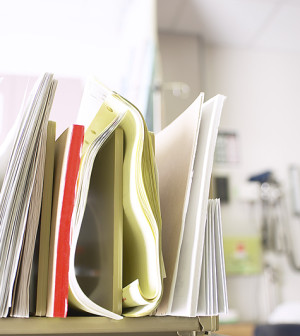- 7 Best Breads for Maintaining Stable Blood Sugar
- Gelatin vs. Collagen: Which is Best for Skin, Nails, and Joints?
- The Long-Term Effects of Daily Turmeric Supplements on Liver Health
- Could Your Grocery Store Meat Be Causing Recurring UTIs?
- Are You Making This Expensive Thermostat Error This Winter?
- Recognizing the Signs of Hypothyroidism
- 10 Strategies to Overcome Insomnia
- Could Artificial Sweeteners Be Aging the Brain Faster?
- Techniques for Soothing Your Nervous System
- Does the Water in Your House Smell Funny? Here’s Why
Screening All Women for Breast Cancer Genes Not Feasible: Study


Screening all women for gene mutations that increase the risk of breast and ovarian cancer is too costly to be feasible, a new study suggests.
Women with BRCA1 and BRCA2 gene mutations have a much higher risk of breast and ovarian cancer than those without the mutations.
A BRCA genetic test costs about $4,000, according to the University of California, Los Angeles (UCLA) researchers.
The study authors found that for every 10,000 women in the general population who were screened, about four more cases of breast cancer and two more cases of ovarian cancer would be prevented, compared with screening only women with a family history of the cancers.
However, BRCA screening would only extend patients’ lives for an average of two days, the researchers added. And for more than 99 percent of women screened, a negative genetic test would not increase life expectancy or eliminate the need for regular mammograms, and could falsely reassure women that they aren’t at risk for breast cancer, the study authors said.
“The cost of BRCA testing would need to drop by 90 percent for testing to be cost-effective for the whole population,” study co-author Dr. Patricia Ganz, director of the division of cancer prevention and control research at the Jonsson Comprehensive Cancer Center at UCLA, said in a university news release.
“It’s like looking for a needle in a haystack,” study co-author Elisa Long, an assistant professor in the School of Management, said in the news release.
“If only one in 400 women across the country have one or both of the BRCA1 or BRCA2 mutations, universal screening would cost $1 million to $2 million to detect a single BRCA mutation, or nearly $400 billion to screen all women in the United States. Perhaps this money could be better spent on other diagnostic tools for young women, such as MRIs, to have the greatest impact,” Long said.
The study was published online recently in the journal JAMA Oncology.
Of the 233,000 breast cancer cases diagnosed in the United States each year, only 5 percent to 10 percent are associated with BRCA gene mutations, according to background information in the news release.
BRCA genetic testing should be limited to women with a known family history of breast, ovarian, tubal or peritoneal cancer, according to the U.S. Preventive Services Task Force.
More information
The U.S. National Cancer Institute has more about breast cancer screening.
Source: HealthDay
Copyright © 2026 HealthDay. All rights reserved.










